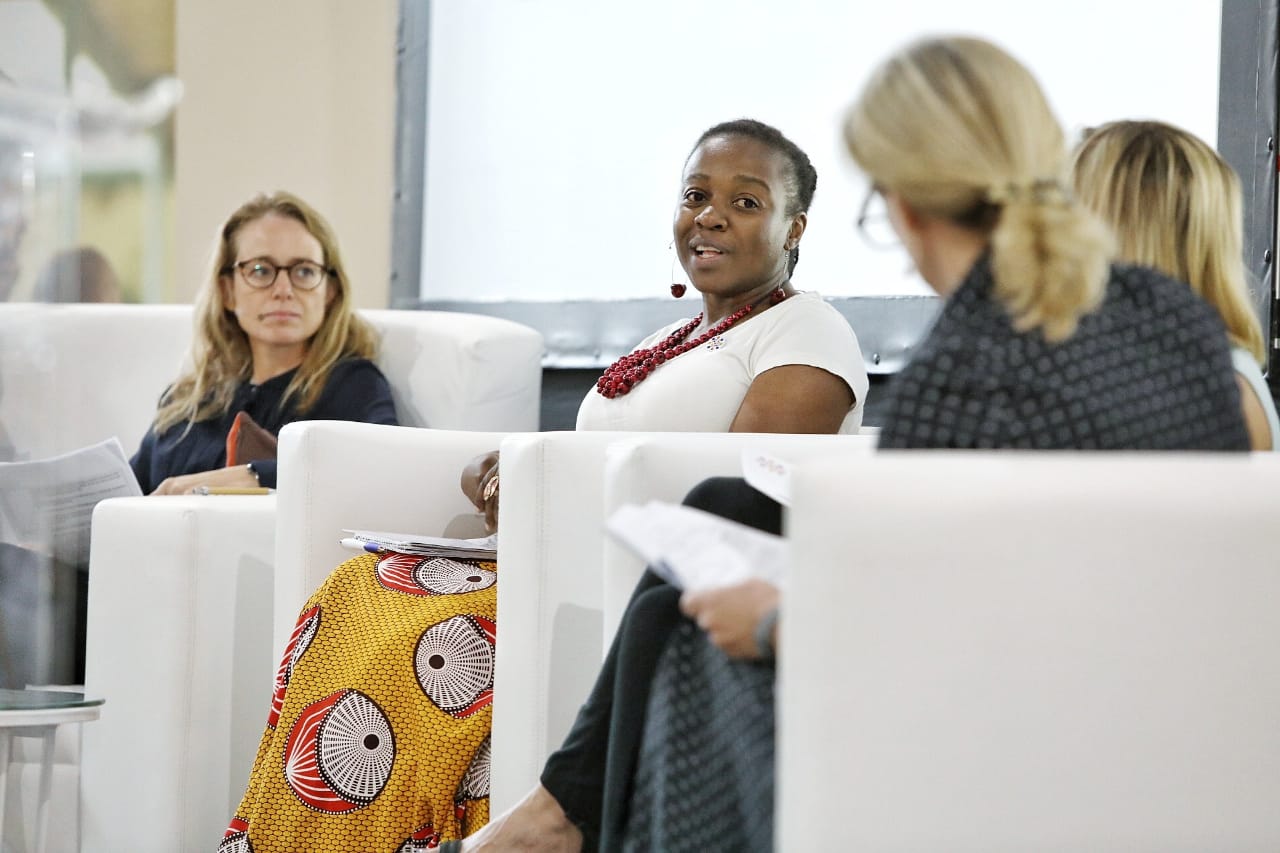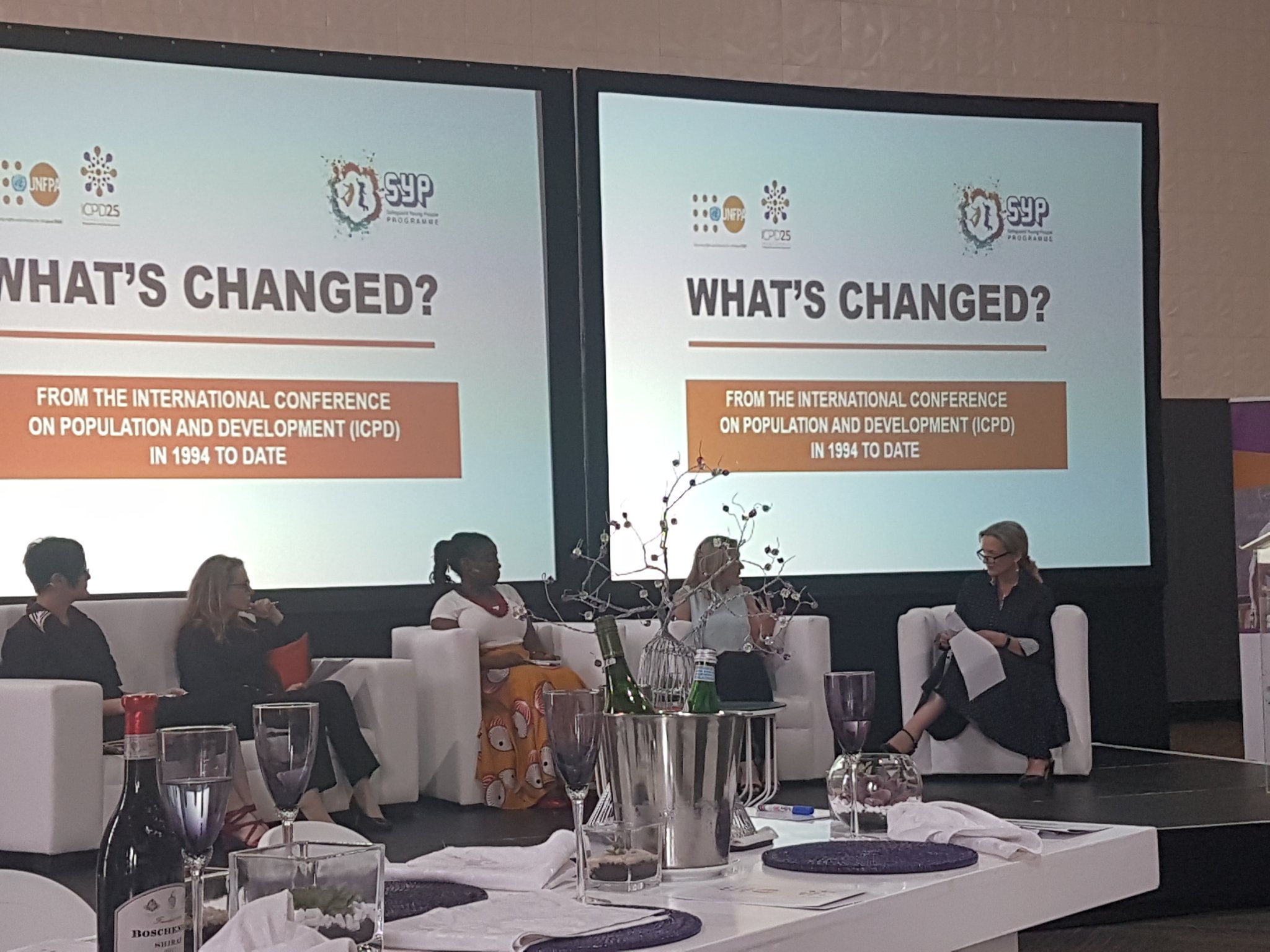On September 20th 2019, The Graça Machel Trust Interim CEO, Dr. Shungu Gwarinda joined development partners during a panel discussion themed What has Changed on Adolescent and Youth Sexual Reproduction Health and Rights since the International Conference on Population and Development in 1994. This took place during an event that was organised by UNFPA East and South Africa Regional Office in Sandton, Johannesburg.
She joined representatives from Proctor and Gamble , Johnson & Johnson and Embassy of Denmark Deputy as taking stock of the work UNFPA has done over the years towards advancing the reproductive health and rights for all, mainly focusing on accelerating the ICPD 25 Agenda.

During the discussion, Dr. Gwarinda touched on how the work of the Trust is inspired by its Founder, Mrs. Graca Machel especially in areas of investing in the youth within the region. “It is around her life as liberation fighter is seen through the second liberation. We stand on the shoulders of her and many African women who are part of the second liberation. What the second liberation really stands for, if we look at 25 years ago, given the example of ICPD, we have made tremendous progress in terms of access to partnerships and investments “, she said.
“What we see in terms of the second liberation is how we begin to invest deeper in tackling the fundamentals so that even when services are available, young men and women still struggle to access that, even when services are available, the choices and decisions they make are really coloured and papered by the social and economic circumstances that inform their day to day existence.”
Shungu also emphasised on how the Trust is putting more effort on Women’s Economic and Social Advancement that focus on making sure that systems are capable and have enough resources available to advance sexual and reproductive health and rights. ” But how do we also change the life circumstances: if it is education as a strategy that will help to tackle some of these issues, we know that the longer girls in school and also when young girls finish school, the outcomes in terms of their health and wellbeing and the opportunities they are able to access in order to advance economically are stronger than those who dropped out of school”, she added.
“We are in a region where in as much as universal access to education, where we are making significant advances, there is still a gap in the number of young girls who complete school, this is worrisome.We also know that as a continent, 30% of young girls get married by the time they are 18 years of age. The implications of that in terms of their reproductive health and their ability to advance and empower themselves becomes problematic”.
On how The Graça Machel Trust works, Dr. Gwarinda said “our approach as the Trust is on how we create opportunities, partnerships and powerful networks that are able to tackle the structural fundamentals that will run the last mile in achieving agenda 2030 and all the outcomes and aspirations that were stipulated in the African Union Agenda 2063”.
Also, the education component of the work of the Trust ensures that girls stay in school and for those that dropped out, there are systems in place that are responsive and sensitive enough to identify and bring them back into school through the Mara Out of School Programme and also provide support for them to stay in school and access support around sexual reproductive health and rights.
Within the women’s space both young and old, Shungu said creating sector-based networks where women can advance each other in terms of leadership and representation and also where they can access economic opportunities is another contribution the Trust is making in investing in women and supporting them in sexual and reproduction health and rights. “We have worked with entrepreneurs whose businesses focus on sexual reproductive health rights products and services and we have looked at how we can link them into access to finance for their businesses, link them to bigger companies and provide opportunities for them to scale and to plug into their value chains as an approach of advancing economically”, she said.
The panellists also spoke on interesting topics about menstrual health, girls having the right to their own bodies and how the private sector can contribute to having access to menstrual hygiene products, the use of language that speaks to the broader audience regarding sexual health. The panel discussion can be viewed by following the link.

Graca Machel Trust Interim CEO, Dr. Shungu Gwarinda joined Proctor and Gamble Corporate Affairs and Citizenship Leader Jeanne du Plessis, Johnson and Johnson Leader Strategic Marketing and Analytics, Bianca Botha and Embassy of Denmark Deputy Head of Mission, Kirina Hedemark on a panel discussing ‘What has changed in the Adolescent Reproductive Health sector.










 The Trust supports and mobilises civil society networks on issues of ending child marriage, ending violence against children, ending female genital mutilation and promoting children’s rights, to carry out advocacy and action across Africa. Special focus is placed on Malawi, Mozambique, Tanzania and Zambia where child marriage continues to be a problem largely driven by poverty, gender inequality, harmful traditional practices, conflict, low levels of literacy, limited opportunities for girls and weak or non-existent protective and preventive legal frameworks.
The Trust supports and mobilises civil society networks on issues of ending child marriage, ending violence against children, ending female genital mutilation and promoting children’s rights, to carry out advocacy and action across Africa. Special focus is placed on Malawi, Mozambique, Tanzania and Zambia where child marriage continues to be a problem largely driven by poverty, gender inequality, harmful traditional practices, conflict, low levels of literacy, limited opportunities for girls and weak or non-existent protective and preventive legal frameworks.




 Education is a fundamental right for all children, which is also a vehicle for social, economic and political transformation in communities, countries and the African continent at large. Recent studies indicate a lack of progress in some of the critical commitments aimed at improving education quality, access, retention and achievement, particularly for girls. In most African countries, girls may face barriers to learning, especially when they reach post-primary levels of education. By implementing multi-dimensional approaches to education which includes core education, personal development, life skills and economic competencies, the Trust partners with funding partners, governments, civil societies and the private sector to improve education access.
Education is a fundamental right for all children, which is also a vehicle for social, economic and political transformation in communities, countries and the African continent at large. Recent studies indicate a lack of progress in some of the critical commitments aimed at improving education quality, access, retention and achievement, particularly for girls. In most African countries, girls may face barriers to learning, especially when they reach post-primary levels of education. By implementing multi-dimensional approaches to education which includes core education, personal development, life skills and economic competencies, the Trust partners with funding partners, governments, civil societies and the private sector to improve education access.

 The Nutrition and Reproductive, Maternal, New-born, Child and Adolescent Health and Nutrition, (RMNCAH+N) of the Children’s Rights and Development Programme aims at promoting the Global Strategy for women, children and adolescents’ health within the Sustainable Development Goals (SDG) agenda. The strategy emphasises on the importance of effective country leadership as a common factor across countries making progress in improving the health of women, children and adolescents.
The Nutrition and Reproductive, Maternal, New-born, Child and Adolescent Health and Nutrition, (RMNCAH+N) of the Children’s Rights and Development Programme aims at promoting the Global Strategy for women, children and adolescents’ health within the Sustainable Development Goals (SDG) agenda. The strategy emphasises on the importance of effective country leadership as a common factor across countries making progress in improving the health of women, children and adolescents. Through its Early Childhood Development (ECD) plan, The Trust will seek to put into action the new science and evidence Report that was presented by Lancet Series on Good and early development – the right of every child. This will be achieved by mobilising like-minded partners to contribute in the new science and evidence to reach all young children with ECD. The Trust’s goal is to be a catalyst for doing things differently, in particular, to rid fragmentation and lack of coordination across ECD sectors. In response to evidence showing the importance of political will in turning the tide against the current poor access and quality of ECD. Even before conception, starting with a mother’s health and social economic conditions, the early years of a child’s life form a fundamental foundation that determines whether a child will survive and thrive optimally.
Through its Early Childhood Development (ECD) plan, The Trust will seek to put into action the new science and evidence Report that was presented by Lancet Series on Good and early development – the right of every child. This will be achieved by mobilising like-minded partners to contribute in the new science and evidence to reach all young children with ECD. The Trust’s goal is to be a catalyst for doing things differently, in particular, to rid fragmentation and lack of coordination across ECD sectors. In response to evidence showing the importance of political will in turning the tide against the current poor access and quality of ECD. Even before conception, starting with a mother’s health and social economic conditions, the early years of a child’s life form a fundamental foundation that determines whether a child will survive and thrive optimally.